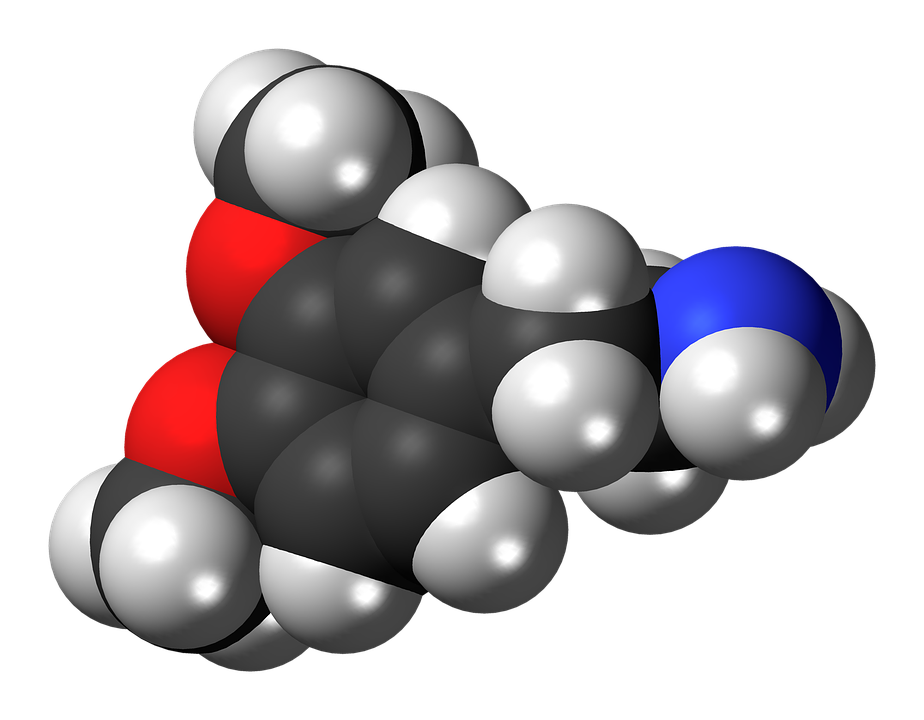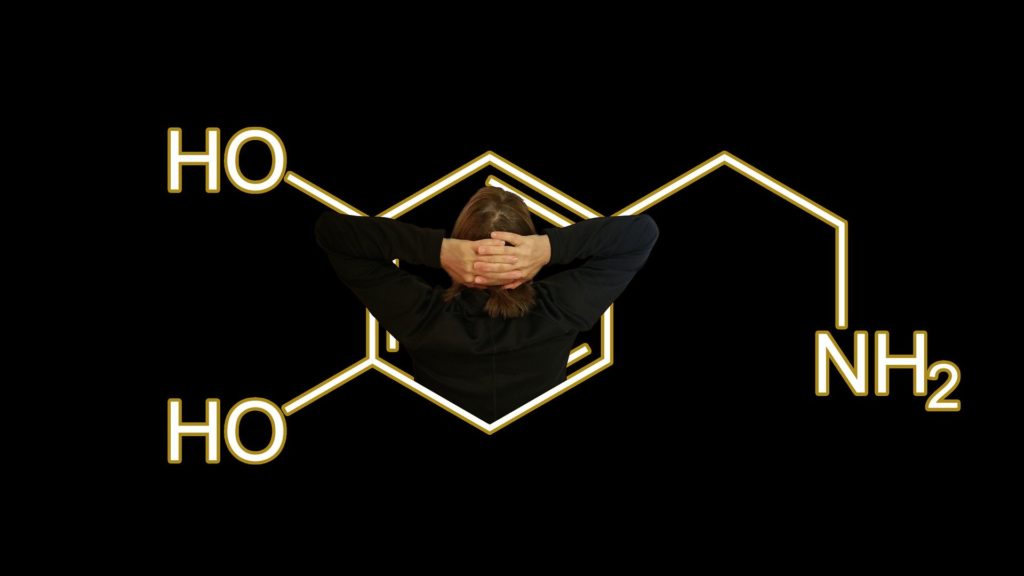
Dopamine
Dopamine (short for dihydroxyphenylethylamine) is a biochemical, hormone, and neurotransmitter that’s vital to a multitude of bodily functions. This substance is also referred to as one of the “happiness” or “feel-good hormones”. The function of dopamine is closely linked to the reward system – and it’s for this reason that this chemical plays a role in the formation of certain addictions.
Generally, though, dopamine keeps you focused and productive: when at sufficient levels, it ensures your mood and cognition are check. It also helps you sleep, meaning it supports both growth and recovery. You’ll be surprised, perhaps, but dopamine also affects movement, working on muscles by activating key physiological pathways.
Issues of Insufficiency
Given how important dopamine is, not having enough of it can lead to all sorts of health issues. If you don’t have a sufficient supply of this chemical, it might be due to the following:
Too little dopamine secretion
Decreased capacity of dopamine receptors
Premature dopamine breakdown
Impaired recirculation of dopamine
The brain goes haywire when there’s not enough dopamine, and this affects both motor and cognitive functions. Here are some signs and symptoms that may point out a shortage:
Feeling depressed for no apparent reason
Decreased ability to feel joy or pleasure
Apathy, lethargy, or unexplained fatigue
Procrastination
Decreased libido (sexual desire)
The good things is that there are accessible remedies (both natural and synthetic options) to fix your dopamine. We’ll discuss a few of the most popular ones a bit later in this post.
One study, however, suggests that altered dopamine signaling may be a factor in the development of autism spectrum disorder (ASD). Upon studying the following symptoms of ASD, experts named low levels of dopamine as a potential culprit:
Difficulty with verbal and non-verbal communication
Non-participation in conversations
Preference to play alone
Insistence on following routines
Stimming (arm-flapping, head-banging)
Fixation with unusual objects or a part of an object
So, unfortunately, not all dopamine-related dilemmas can easily be resolved – and this just shows once again how crucial this brain chemical is in ensuring that both the body and mind stays in optimal shape.
Precursors and Sources
Tyrosine, a hydrophilic amino acid present in most proteins, is the precursor of dopamine. Tyrosine is first converted to L-DOPA (or Levodopa), a substance that the body transforms into dopamine. Meat (particularly poultry meat) and dairy products are loaded with tyrosine. If you’re not too keen on those, here are some good alternatives:
Almonds
Avocados
Bananas
Chocolate
Coffee
Lima beans
Peanuts
Pumpkin seeds
Sesame seeds
Watermelon
Supplements that contain L-DOPA are also available and are recommended for those who value their convenience. Mucuna pruriens, a plant that’s also known as “magic velvet bean”, is a tropical legume cultivated in parts of Africa and Asia. It’s one of the few natural sources of L-Dopa – but given where it’s grown, you’ll probably only see it in capsule form.
Mucuna pruriens stimulates the hypothalamus, which links the autonomic nervous system with the endocrine system via the pituitary gland. The hypothalamus first secretes gonadotropin-releasing hormone (GnRH), signaling the pituitary to do its work. The pituitary (the “master gland”), in turn, produces human growth hormone (HGH).
The hypothalamic-pituitary-gonadal axis (HPG) is the same trio that’s responsible for the secretion of testosterone – the hormone that provides us with muscle mass, hair growth, strength, and libido. HPG regulates dopamine and vice versa, making the relationship between them bidirectional.
All in all, there’s growing interest in the potential use of HGH (naturally-occurring and synthetic) for slowing down such age-related changes as an increase in body fat and decrease in muscle and bone mass. In studies involving healthy adults taking synthetic HGH, increased muscle mass is a common outcome; however, that doesn’t necessarily translate to increased vitality.
Benefit of Cold Showers
Aside from drinking tea, you may take a cold shower to get a dopamine boost. How does that work exactly? For the brain to function adequately, it has to experience physiological stress. In one experiment, participants were required to take two to three-minute-long cold showers (20°C) twice a day for several months.
It was discovered that cold hydrotherapy can stimulate the sympathetic nervous system, thereby increasing levels of beta-endorphin in the blood and increasing noradrenaline levels in the brain. When cold water touches the skin, mechanoreceptors (peripheral nerve endings) send an enormous surge of electrical impulses that jolts the brain.
Interestingly, those who participated in the study noted a reduction in depressive symptoms. Taking cold showers was also found to have an analgesic effect, meaning it alleviated pain. The researchers, however, were clear about the need for more extensive studies to further confirm their findings.
The Magnificent Matcha
If you prefer something hot, you should probably consider drinking Matcha tea. This oriental beverage improves cognitive functions, enhances alertness, increases concentration, and promotes a sense of wellbeing in general. Matcha’s superior L-Theanine content (compared to other types of green tea) is what causes an increase in dopamine production.
The hot beverage also strengthens the immune system – a single cup of Matcha has ten times more antioxidants than regular tea. In addition, a special substance known as theophylline (which belongs to the same chemical group as caffeine) makes Matcha a great alternative to common stimulants. While the boost you get from coffee is fleeting, Matcha sustains your energy levels much longer, thus further enhancing your mood and drive.
Keep in mind that you don’t have to visit East Asia just to get your hands on such a remarkable drink. There are Matcha tea preparations readily available on the market. Usually, they come in powder form, meaning you’ll only have to mix them in hot water whenever you’re feeling low or tired.
A Pornography Dilemma
So far, we’ve discussed some easy ways to boost your dopamine levels. Before we wrap up this article though, it’s important that we talk about the problem with porn. When watching porn, dopamine floods the area of the brain responsible for emotion and learning, giving a sense of heightened focus and craving.
The pleasure experienced is quite overwhelming so that the next time there’s an “itch” for more erotic pleasure, packets of dopamine are released in the brain. Inevitably, when dopamine production slows down because a higher level of satisfaction wasn’t reached, feelings of frustration will surface. Concentration and motivation will likely suffer as well.
You don’t need to resort to porn to get that sexual high: instead, opt for some quality intimacy with your lover or spouse. Besides, actual intimacy will give you a good shot of other happiness hormones such as norepinephrine, endorphins, and serotonin. Also, your craving for more physical contact would be transformed into a stronger desire for each other, thanks to that surge of hormones.
Knowledge to Fight Back
No matter what we do, there will be days when we’ll feel awfully negative and unmotivated – that’s just how life is. However, you can equip yourself with knowledge on how to fight back that destructive feeling with a good kick in the teeth. For example, a quick cold shower, a steaming cup of frothy green tea, a good serving of stir-fried chicken salad, or just a cuddling session with your significant other might just do wonders for your mood and drive.


